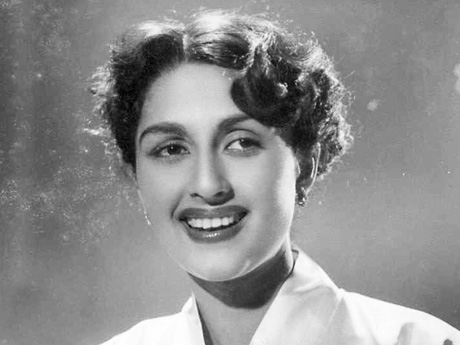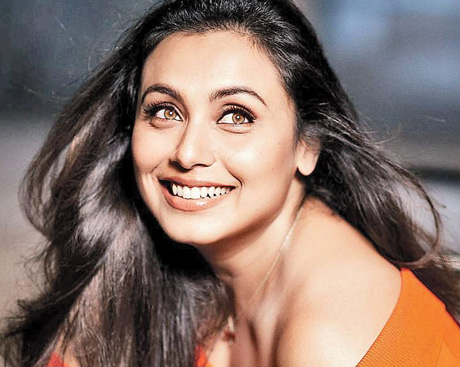Bollywood Masala Mix
and off the screen

By Haresh Pandya
Bina Rai was a leading Hindi cinema actress of the 1950s and 1960s admired for her elfin charm and versatility. Beautiful and talented but slightly introverted, Rai made fewer films than her contemporaries. "I believe in quality, not quantity," she said, and many of the 30 or so films she made were critically acclaimed and commercially successful.
There was a regal aura about Rai, who is particularly remembered for her performances in classic films such as Anarkali (1953), Ghunghat (1960) and Taj Mahal (1963). Ghunghat, directed by Ramanand Sagar, brought the Filmfare Award for Best Actress despite Asha Parekh's substantial role in the film. "A woman of rare elegance, she was like a queen on and off the screen," Parekh said of her. "She wasn't quite like the average film person. She always appeared to be different and detached. But what an actress!"
Rai acted opposite the handsome Pradeep Kumar in these three blockbusters and a couple of other films; theirs was one of the most popular pairings in the history of Hindi cinema. Rai did not have such good chemistry with the brother-in-law of the actor-director Raj Kapoor, the dashing Prem Nath, with whom she worked in a few films, notably Anarkali, and Aurat (both 1953), the latter a Bollywood version of the Biblical tale of Samson and Delilah. However, the two fell in love during the making of Aurat, and married and set up their own production unit, P.N. Films.
Shagufa (1954), with Rai and Nath in lead roles, was its first offering. The starry-eyed lovers of Aurat had pinned high hopes on their first independent venture, but Shagufa failed at the box office; neither Rai's ethereal beauty nor Nath's touching portrayal of a doctor could save it. Prisoner of Golconda, Samunder and Watan, which followed, were also flops.
Bina Rai was born on 4th June, 1936 into a conservative family in Lucknow in the northern state of Uttar Pradesh. As a first-year arts student at Isabella Theodore College in Lucknow in 1950, she saw an advertisement for a contest for talented actors. On an impulse she applied and, to her surprise, received a call from the sponsors.
She won the contest, held in Mumbai, along with a staggering prize (in those years) of $500. The veteran actor and producer Kishore Sahu offered her the lead role in his film Kali Ghata. Though Rai had acted in some plays in college, she had never dreamt of appearing on screen. She was tempted by the offer but her parents did not want to let her act in films. She went on hunger strike until her parents gave in.
Kali Ghata (1951), which launched her film career, was only moderately successful, though her beauty did not go unnoticed. The same was the fate of her next two films, Shole and Aurat with Ashok Kumar and Nath respectively, which came two years later.
Her fourth release, Anarkali, made her a star. It was based on the legend of the Mughal emperor Jahangir, and Rai's eponymous, sensitive portrayal of the ill-fated dancing girl in love with the crown prince Salim had the critics gasping. Anarkali was the top-grossing Hindi film of its year and one of the biggest hits of the 1950s.
Rai was offered what became a celebrated role, the prostitute and dancer Chandramukhi in the 1955 classic Devdas opposite the reigning superstar of that time, Dilip Kumar. But she refused, saying it was beneath her dignity to play what she called an "immoral" character. She stopped acting after her last film Daadi Maa (1966), claiming that "women of a certain age don't get good roles". Her husband, who later emerged as a ferocious and much sought-after Bollywood villain, died in November 1992.
Her son Prem Kishen tried his luck at acting then became a television producer, while her grandson Siddharth Malhotra directed the successful medical television drama Sanjivani in 2004.

As a celebrity with over two decades of experience in the world of Indian showbiz, Rani has also immersed herself in philanthropic works. While she finds it gratifying, she feels this is not something for actors or businessmen to do alone.
"I think we all being citizens of the world, have a responsibility and it's not just for the sake of doing certain things because I am an actor, socialite or a business person.
"I think what's important is that apart from the careers we choose, it is our basic duty as human beings to able to help other human beings... Or help in a cause because that's what makes us truly citizens of the world," Rani told IANS in a tete-a-tete here.
Her film "Hichki", in which she plays a woman with Tourette Sydrome has been widely lauded for spreading awareness on a little known nervous system disorder involving repetitive movements or unwanted sounds, with an entertaining and emotional story at its core.
At the Indian Film Festival of Melbourne (IFFM) here, Rani was awarded the Best Actress for her role in the film. She feels when a film like this wins an award, it helps in pushing the awareness it sets out to spread.
When "Hichki" had released, Rani had said she won't take long gaps if the movie works. So when do we see her on-screen again?
"I will be doing projects, and you will be getting to hear about them soon," she said.
Will she pick another issue-based movie?
"Let's see... I don't want to say much. So wait for the announcement," the actress, looking resplendent in a black ensemble by her forever favourite designer Sabyasachi Mukherjee, said with a smile.
Her Melbourne trip was special. More so because her daughter Adira, who was born in December 2015, was travelling with her. She took the little one to the aquarium, zoo, a 'bouncing garden' and amusement park to entertain her.
"I got her all the way to Melbourne and it was my duty as a mother to entertain her as much as I could. I took her to an amusement park and it was the first time she sat in a roller coaster. And she is really brave. 'Mumma, I want to go again'. So, she's quite a daredevil like that," Rani said.
Is that like you?
"Yes," said the proud mother, who is married to filmmaker Aditya Chopra.
As a mother, patience is one virtue that Rani has realised about herself.
"When you are a working professional and when you're working round the clock, I think you forget the word patience. Also, I think we as actors are used to the phenomenon because a lot of times we are waiting for shots in the vanity vans and waiting, waiting, waiting till the next shot comes.
"Being a mother I realised there's no time to sit ideal. For me, it's 24*7 work and attention. The only time when Adira will not need attention is when she is in deep sleep. The rest of the time I have to be all attentive for her."
Rani is glad she was able to break the cliche around actresses who become mothers. It was her husband who pushed her to work.
But what about being directed by him?
"I think there are some things that we should just leave for later... Probably Adira will make that phenomenon happen... I guess, all in time."
"Since childhood, girls face judgment. Be it about looks or behaviour, they are being judged on everything.
"While getting married, judgmental questions like, 'How a girl looks like, what's her skin tone, how is her nature' are being imposed on our girls for a long time. I am not saying that men are not judged, but women have to face more judgment than them," the 30-year-old said.
Swara was promoting the second season of her web show.
She believes that the status of women has changed in India, but said there is still a long way to go.
"From a long time, the Hindi phrase 'Log kya kahenge (what will people say) has made our women weak and has suppressed their voice, but now women are breaking all the ceilings and are moving ahead."
The 'Veere Di Wedding' actress had faced flak over a masturbation scene that she did in the film. She says she believed in the role and did it.
"While performing any role, an actor should have faith in it. If you don't have faith in a role, it would be hard to perform it on-screen," added Swara.
"Sonu and I haven't even met since the last shot with Krish (director) last year. He is busy filming Simmba. He couldn't even give us tentative dates to match combinations with other actors. The producers showed him the film and writers narrated the patchwork to him...he refused to meet me ...he vehemently denied to work under a woman director..... which is kind of amusing because Sonu is a dear friend and I have even launched the music of a film that he produced on his request..... even though the team suggested that they have full faith in me, it seems, Sonu had neither dates nor faith," said Kangana Ranaut to Pinkvilla.
"And when I last spoke to him he suggested that I can go ahead with someone else and when I narrated the script to Zeeshan Ayyub, he called the studio and gave the dates. By that time it was too late as Zeeshan gave me dates for September. Now, I hear I had a showdown with him..... when I never met him, never directed him ..... when did I have this showdown?."
"Yes, none of the portions he has shot before will be used because he has spiked hair with gel in his hair (for Manikarnika)..so the new team of DOP and editors and our writers of Manikarnika have discarded those scenes so I have to shoot all of that anyway so it's easy to get another actor on board. Who keeps spiked hair for a period film?"
"He himself wrote his scenes of Kushti...like Dangal...which were never in the script. He and director shot a lot of stuff which was never in the script and the writers discarded those. Is it my fault? Am I writing the film? He wanted the producers to retain the Kushti portions as he made the body for it, for 4 months. How do I know what is happening behind my back?. When the writers saw the film, they said they don't want it."
"One more thing, I never asked anyone to put my name on clapboard it's AD's business .... person on the floor is in charge, is answerable for many things that must have been the idea but constant attacks while I am going through a difficult phase is not acceptable. I am just a slave in Manikarnika's hands. I am doing this only for her ..... I have made it clear to everyone."
"Sonu has always been a thorough professional and honoured all his commitments. He had informed the makers of Manikarnika about his dates and schedule, well in advance. Inconveniencing the team of his current film, to accommodate the demands of another are against his professional principles. Sonu has taken the higher road ahead and wishes the team of Manikarnika all the best."